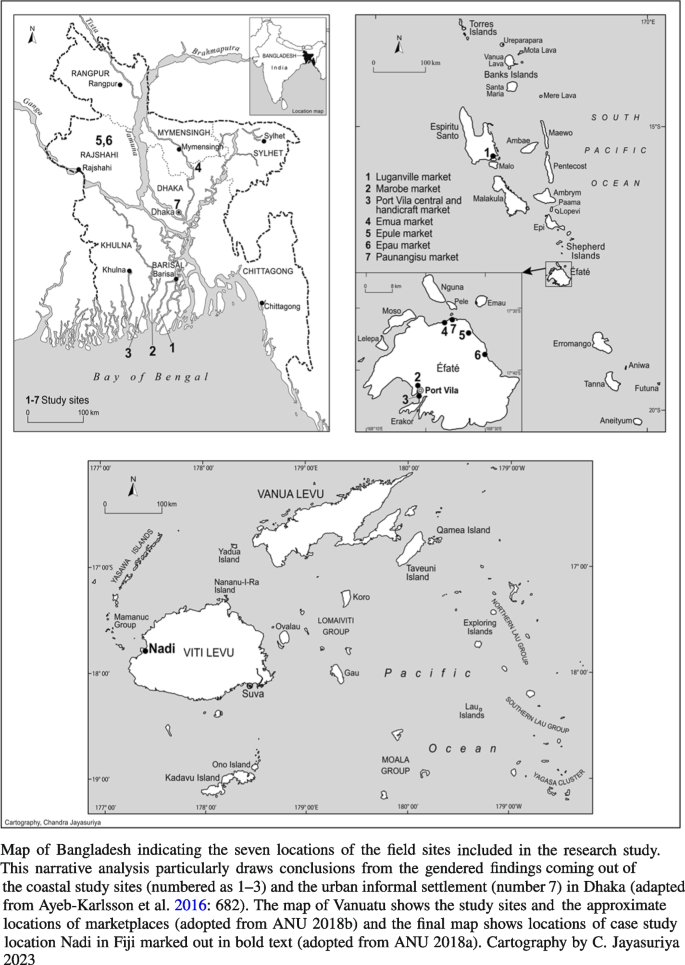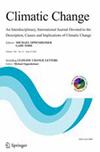损失与治愈的故事:亚太地区非经济损失与损害、性别暴力和福祉侵蚀的联系
IF 4.8
2区 环境科学与生态学
Q1 ENVIRONMENTAL SCIENCES
引用次数: 0
摘要
众所周知,在气候变化的背景下,妇女、儿童和其他交叉和边缘化的社会群体受到“非经济福利损失”的影响不成比例。然而,很少有实证研究调查其与暴力侵害妇女和儿童(VAWC)的相互关系。我们迫切需要扩大对“非经济损失(和损害)”总称(NEL(D)s)的认识,以便社会能够适当地避免、尽量减少和处理弱势群体的损失和损害。通过失去和治愈的故事,我们深入现实,说明在孟加拉国、斐济和瓦努阿图的气候暴力关系中,妇女和儿童如何遭受非经济福利损失。一个讲故事和系统分析的方法指导了通过二次数据审查和实证实地工作收集的个人叙述的分析。研究结果确定了在结构性暴力和气候风险背景下损害妇女和儿童心理健康的不同途径。在孟加拉国,这些叙述描述了性别(非)流动性背景下的福祉侵蚀;在斐济,调查结果记录了妇女和儿童在自然灾害背景下遭受性暴力、家庭虐待、剥削和贩运的经历,而在瓦努阿图,妇女在灾后恢复的故事中讲述了困难、性别依赖和康复。本文全面阐述了气候变化和性别暴力对社会福祉的长期影响。它还确定了需要进一步关注的研究差距,并提出政策建议以及方法和灾害卫生服务解决方案,以应对气候变化未来的福祉损失。本文章由计算机程序翻译,如有差异,请以英文原文为准。

Stories of loss and healing: connecting non-economic loss and damage, gender-based violence and wellbeing erosion in the Asia–Pacific region
Abstract It is well-known that women, children, and other intersectional and marginalised social groups are disproportionately impacted by ‘non-economic wellbeing loss’ in the context of climatic changes. However, few empirical studies investigate its interrelation with violence against women and children (VAWC). We urgently need to widen our perceptions of what falls under the umbrella term ‘Non-Economic Loss (and Damage)’, NEL(D)s, for societies to appropriately be able to avert, minimise, and address losses and damages among vulnerable people. Through stories of loss and healing, we step into the realities of illustrating how women and children experience non-economic wellbeing loss within a climate-violence nexus in Bangladesh, Fiji, and Vanuatu. A storytelling and systems analysis approach guided the analysis of personal narratives gathered through a secondary data review and empirical field work. The research findings identified different pathways through which women and children’s mental health was compromised in the context of structural violence and climatic risks. In Bangladesh, the narratives described wellbeing erosion in the context of gendered (im)mobility; in Fiji, the findings captured women’s and children’s experiences of sexual violence, domestic abuse, exploitation, and trafficking in the context of natural hazards, while in Vanuatu, hardship, gendered dependence, and healing were narrated by women in their stories surrounding disaster recovery. This article comprehensively lays out the longer-term societal wellbeing consequences of climatic changes and gender-based violence. It also identifies research gaps in need of further attention and proposes policy recommendations as well as methodological and disaster health service solutions to address wellbeing loss in a climate changed future.
求助全文
通过发布文献求助,成功后即可免费获取论文全文。
去求助
来源期刊

Climatic Change
环境科学-环境科学
CiteScore
10.20
自引率
4.20%
发文量
180
审稿时长
7.5 months
期刊介绍:
Climatic Change is dedicated to the totality of the problem of climatic variability and change - its descriptions, causes, implications and interactions among these. The purpose of the journal is to provide a means of exchange among those working in different disciplines on problems related to climatic variations. This means that authors have an opportunity to communicate the essence of their studies to people in other climate-related disciplines and to interested non-disciplinarians, as well as to report on research in which the originality is in the combinations of (not necessarily original) work from several disciplines. The journal also includes vigorous editorial and book review sections.
 求助内容:
求助内容: 应助结果提醒方式:
应助结果提醒方式:


